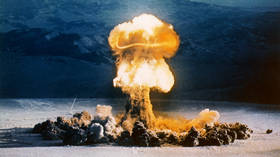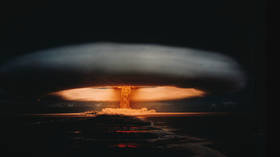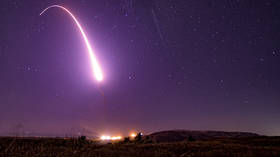US must prepare for war with China and Russia – Congress

The US needs to urgently update and expand both its nuclear arsenal and the conventional military in order to face the combined might of Russia and China, the congressional Strategic Posture Commission argued in its final report published on Thursday.
“The United States and its allies must be ready to deter and defeat both adversaries simultaneously,” the commission said. “The US-led international order and the values it upholds are at risk from the Chinese and Russian authoritarian regimes.”
While the commission has not identified any specific evidence of Russia and China working together, “we worry... there may be ultimate coordination between them in some way, which gets us to this two-war construct,” a senior official involved in the report told Reuters on condition of anonymity. The current US national security strategy calls for defeating one major adversary while deterring another.
The commission argued that the combined threat from China and Russia will become acute as early as 2027, so “decisions need to be made now in order for the nation to be prepared.” The 131 findings and 81 recommendations in the report amount to the need for massive expansion of both the conventional armed forces and the Nuclear Triad.
The report demands more of the B-21 stealth bombers and Columbia-class ballistic missile submarines. The B-21 is still in development and is expected to enter service by 2027 at the earliest. The first two Columbia-class subs are under construction and are expected in 2030. The US Navy has planned to order 12, to replace the 18 Ohio-class boats currently in service.
“Amid all of the Commission’s recommendations to increase the number of strategic and tactical nuclear systems, there is almost no mention of cost in the entire report,” which “does not seem to acknowledge any limits to defense spending,” the Federation of American Scientists (FAS) said in response.
At a press event announcing the report, the commission’s vice chair, retired Republican Senator Jon Kyl, argued that higher military spending is a small price to “hopefully preclude” a possible nuclear war, and that President Joe Biden and Congress need to “take the case to the American people” to spend more money.
According to the FAS, however, the commission’s recommendations are “likely to exacerbate the arms race, further constrict the window for engaging with Russia and China on arms control, and redirect funding away from more proximate priorities.”
The only reason the commission did not argue for an immediate expansion of the US nuclear stockpile “is that the weapons production complex currently does not have the capacity to do so,” the FAS noted, adding that there is no need for a nuclear arms race so long as the US has enough submarines to present a credible deterrent to a first strike by an adversary.















